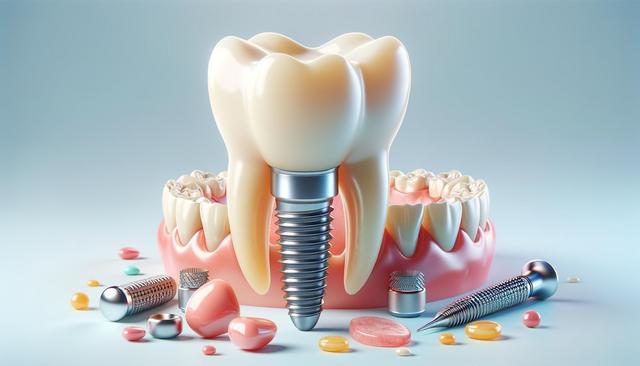What Are Dental Implants?
Dental implants are artificial tooth roots typically made from biocompatible materials, such as titanium, which are surgically placed into the jawbone. They serve as a stable foundation for fixed or removable replacement teeth. Unlike removable dentures or traditional bridges, implants are designed to fuse with the bone over time, providing a secure and permanent solution for tooth loss. This process, known as osseointegration, allows the implant to mimic the function and strength of natural teeth.
Dental implants are used to support a variety of restorations, including:
- Single crowns for individual missing teeth
- Bridges supported by implants for multiple missing teeth
- Full dentures anchored with multiple implants
Because they integrate directly with the jawbone, implants help maintain bone structure and prevent the bone loss that often accompanies missing teeth. This makes them a preferred choice for many patients seeking a long-term and functional replacement option.
The Dental Implant Procedure
The process of getting dental implants involves several stages, typically spread out over a few months. The first step is a consultation and evaluation, during which a dental professional examines the patient’s oral health and determines whether they are a suitable candidate for implants. Factors such as gum health, bone density, and overall medical condition are considered.
The procedure usually includes:
- Initial assessment with X-rays or 3D imaging
- Surgical placement of the implant into the jawbone
- Healing period to allow for osseointegration
- Placement of an abutment and final crown or restoration
Each stage is crucial to ensure the longevity and success of the implant. Healing time may vary depending on the individual’s health and the complexity of the case. In some cases, bone grafting may be needed if there is insufficient jawbone to support the implant.
Benefits of Choosing Dental Implants
Dental implants offer numerous advantages compared to other tooth replacement options. One of the most significant benefits is their ability to function like natural teeth. Because they are anchored in the jawbone, they provide a stable and secure fit, allowing individuals to eat, speak, and smile with confidence.
Other notable benefits include:
- Improved oral health and hygiene, as implants do not require altering adjacent teeth
- Enhanced aesthetics, with restorations that look and feel like real teeth
- Durability, with proper care implants can last for many years
- Support for facial structure, preventing the sunken appearance that sometimes results from tooth loss
These benefits make dental implants a compelling option for people who want a dependable and aesthetically pleasing solution to missing teeth.
Considerations and Candidacy
While dental implants are widely used, not everyone is an ideal candidate. Certain health conditions, lifestyle habits, and oral health factors can affect the success of an implant. For instance, individuals who smoke or have chronic conditions such as uncontrolled diabetes may experience slower healing and reduced implant success rates.
Good candidates typically include those who:
- Have healthy gums and adequate bone volume
- Maintain good oral hygiene practices
- Are free from conditions that impair healing
- Are committed to follow-up visits and care
A thorough assessment by a dental professional will help determine whether implants are suitable. In some cases, preparatory procedures such as bone grafting or sinus lifts may be recommended to improve the treatment outcome.
Long-Term Care and Maintenance
Maintaining dental implants is similar to caring for natural teeth. Daily brushing and flossing, along with regular dental check-ups, are essential to ensure the longevity of the implants. While implants themselves do not decay, the surrounding gums and tissues must remain healthy to support the implant over time.
Key maintenance practices include:
- Brushing twice daily with a soft-bristled toothbrush
- Using non-abrasive toothpaste and floss specifically designed for implants
- Attending routine dental exams and professional cleanings
- Avoiding excessive force or grinding, which can damage the implant
With proper care, dental implants can remain functional and aesthetically pleasing for many years. Regular monitoring by dental professionals is critical to address any potential issues early and to ensure the continued health of the surrounding bone and gum tissue.




Leave a Reply